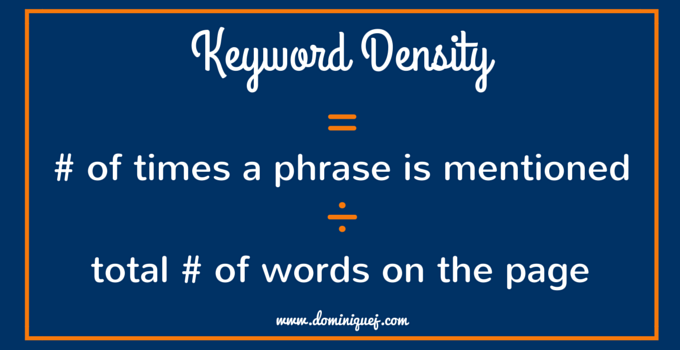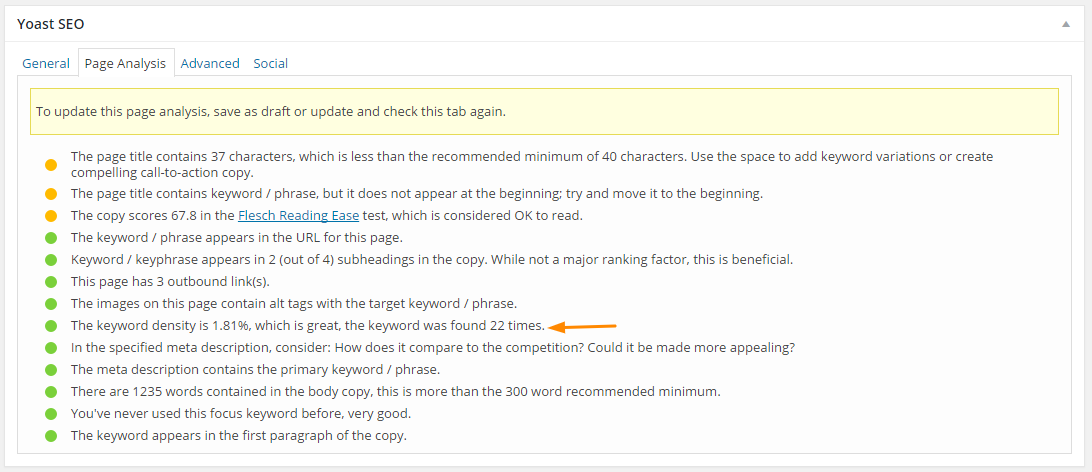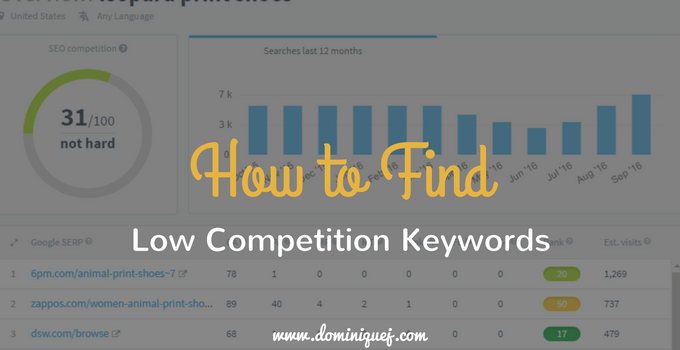In a recent guest post I did on Sprout Social about blogging tips, there was a comment about keyword density. Here’s the exact question:
Hi, Dominique..
Thanks for your share..
I just wanna ask about keyword density in article’s..
Just 3 keyword on article or 2% of total words?
I left a reply, but I started thinking this is a good topic to expound on since I’m sure it’s something that a lot of you are curious about. The main point I made in my reply was that you shouldn’t worry so much about keyword density. I want to dig a little more into why I don’t care about keyword density, and give you some good tips to write awesome blog posts that are SEO friendly without stressing over keyword density.
What Is Keyword Density?
Keyword density is the number of times a specific keyword is used on a page compared to the total amount of text on that page. It’s a percentage. For example, if an article is 100 words long, and a specific keyword only shows up once on that page, its keyword density is 1%.
People use keyword density for SEO purposes. The goal is have your target keyword appear often enough that Google knows that it’s the main focus of your blog post or page. But you don’t want that keyword to appear too many times on a page because Google could see it as over-optimization and spammy. So people use keyword density as a way to make sure that there’s a good balance between making the page relevant for the keyword and avoiding over-optimization. The recommended keyword density is around 1-3% but that can vary depending on who you ask.
If you use the Yoast SEO plugin, they’ll tell you your keyword density after you specify your main keyword for each post. You’ll get a green light when you’re in the “safe” zone, and a yellow, orange or red light if you’re going overboard.
But personally, I don’t care about that. And here’s why.
Why You Shouldn’t Care About Keyword Density
If you’re writing naturally without purposely trying to fit in your keyword, you don’t have to worry about density. I never check on the keyword density of my articles. Why? Because I don’t write for search engines, I write for people.
The whole point of watching your keyword density is to avoid content that looks unnatural to search engines. Well when you’re not thinking about whether or not you’re using a keyword too much or density, you’re writing completely natural. And in my experience, that gives you the best results.
The problem is that when people start to learn about SEO, they get fixated on the idea of keywords. And then there’s a bunch of so called SEO “experts” stressing the importance of mentioning your keyword as much as possible throughout your pages. All of that starts to influence the way you write. You start to make a big effort to include your target keywords in places you probably wouldn’t if you never knew anything about SEO.
[Tweet “If you didn’t know anything about SEO, would you write differently?”]
And that is why a lot of the best bloggers don’t really know or care about SEO and keywords. Don’t get me wrong, I think anyone serious about blogging should at least learn the basics of SEO. But in some cases ignorance is bliss. I see blog posts ranking for pretty competitive keywords and I can tell that the person who created the content didn’t pay any attention to SEO when they created the post. They just created the best content they could.
That’s what you should start doing. Write naturally and pretend that SEO doesn’t exist. If Google is influencing your content creation process to the point that you’re resorting to using formulas to figure out the ratio of a keyword to the overall word count, there’s a good chance the quality of your content is suffering. Just sayin….
Let me go ahead and ease your worries a little bit too. A lot of people talk about being afraid of being penalized for over-optimization and keyword stuffing. I’ve seen blog posts from the “experts” again that straight up say your site will get penalized for using a keyword too much. But the truth is that you have to try really hard to get your site penalized for mentioning a keyword too much. And just because your blog’s rankings may have dipped a bit, that doesn’t mean your site was penalized. But that’s an entirely different topic.
My point is that if the quality of your content is top notch, there’s a VERY small chance of Google viewing your site as spammy just because your keyword density is 7% on some of your posts. The sites that tend to penalized are the ones where a keyword is mentioned to the point that it looks completely unnatural. Those are the blogs that are really low quality, the content is garbage and they don’t offer any value. If that sounds like your site, then you need to do a content overhaul buddy.
How To Write SEO Friendly Content Without Keyword Stuffing
The main reason people are concerned with keyword density in the first place is because they want to make sure Google sees their content as relevant. You can show Google that your blog posts are relevant for a certain keyword without trying to force it or stress over keyword density.
I gave a pretty big tip on how to do this in my reply to that comment I mentioned in the beginning. Using this technique alone will help you create SEO friendly content without over-optimizing.
A good tip to make sure you’re not keyword stuffing is to add variations of your post’s main keyword and related terms. For instance, if you were writing a post targeting the phrase “best dog collars” you could use a ton of different variations and related phrases like:
– collars for dogs
– a good dog collar
– leashes
– pet leash
– dog harness
Basically, start using different variations of your main keyword plus some related phrases. I don’t measure my keyword density, but if I catch myself using the same phrase over and over again within a post, I try to vary it up a little bit.
Using synonyms, related phrases, and variations of your keyword is one of my keys to on-page optimization and why I’m able to get nice rankings for content even without earning any backlinks.
This isn’t a blog about SEO, so I won’t go too deep into it here, but I highly recommend reading up a little bit about Latent Semantic Indexing (LSI) and LSI keywords. I’ll probably do a seperate blog post about LSI keywords because even though my site isn’t really about SEO, LSI keywords play a huge role in blogging. I think a good blog post about how to start using LSI keyword in your content will really help you get more organic search traffic to your blog. So I’ll see if I can write something up for you all.
Write For People, Not Robots
It all boils down to that. Just create content for your audience. You have no control over how Google views your site. But when you make awesome content and promote it, you won’t have to pull your hair out stressing about hitting a certain keyword density percentage. I sure don’t.






Great article Dominique, as always 🙂 I haven’t looked at keyword density for years. Writing for users and then knowing how to promote it is definitely the most important thing. People obsessing over their keyword density are wasting their time and most likely will probably hurt themselves. Writing for users always will come out more natural.
Thanks Brian. You nailed it, just write for users and you’re good to go.
After reading this post, I think I pretty much know why I don’t rank well in Google. My keyword density is like 1% lol. It’s going to take a while to fix that I guess 🙁
Thanks for the info.
Glad it was helpful Nicole! Also keep in mind that keyword density isn’t everything.